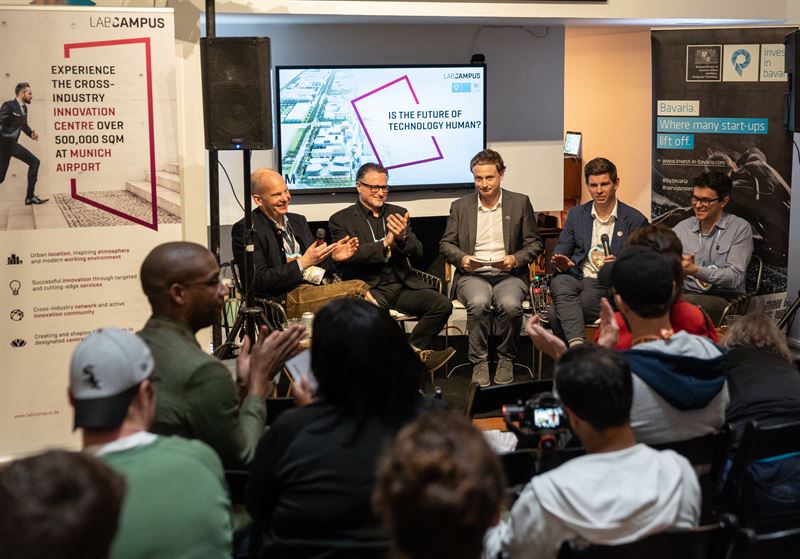Analog skills versus digital technology

Will the future of technology have a human face?
Dr. Marc Wagener, the managing director of LabCampus, is committed to a collaborative and people-centered approach. At this year's SXSW Interactive Conference, he explained how that outlook will define the way forward for Munich Airport's future innovation center
The LabCampus team is back from South by Southwest in Austin,Texas. For digital entrepreneurs and creatives, SXSW provides an annual platform for groundbreaking trends shaping the future of society, culture and technology. Those looking for insights into the role of the individual in this context, attended the high-caliber panel discussion "Will the future of technology be human?" initiated by LabCampus GmbH. LabCampus managing director Dr. Marc Wagener made his position clear right at the outset: "Technology has the potential to improve our lives as long as we're pulling the strings. It's essential for all of us to play an active role: Otherwise things are created through the initiative of individuals that don't necessarily reflect the will of the majority."
Olaf Groth, a professor of Strategy, Innovation and Economics at the HULT International Business School, reminded the audience: "There is broad divergence around the world in cultural attitudes to data and the resulting power of those who control it." But he dismisses as overblown the grim future scenarios where artificial intelligence does all of the work once done by humans or could even take over the world. Dr. Groth continued: "The important thing is for individuals and social institutions to be placed in a position to control these developments, to ensure that they remain agile and flexible, and to decide themselves how they are used!" As an example, he added: "A lot of car makers say: 'Our cars are safe. Just look at these test reports. They're fun to drive, too, and the quality is excellent. And that's exactly what you get for your money.' Why don't we hold internet companies to the same standard as everybody else we deal with in our lives?"
Ryan Kelly of Virgin Hyperloop One described how technology is reshaping the way people work in companies: "High-speed infrastructure is no longer a matter of 'mobility' – it will entirely redefine the social and urban landscape. We will commute over distances that were once inconceivable."
Fábio Duarte of the MIT Senseable City Lab explained that the interplay between citizens, digital infrastructure and cities will play an ever-increasing role. "Carpooling would be possible for more than 90 percent of trips in New York if people were only willing to wait just five minutes. But commercialized enterprises with digital sharing services were faster." So if data is the new oil, there's no point just drilling in the hope of striking it rich. The value comes from filtering out the data reflecting real human behavior and building on it. And to do that, human input is probably needed.
But how can we ensure that the technology does not take control? And what will the future of humanity look like? The answer from LabCampus managing director Dr. Wagener: "Technology consists of developments by people. We have to make sure that this development is happening in the interests of the majority, and not for individual interests or just to earn profits. So, when developing new technologies, we need to take different competencies and perspectives into account. And that means extending our collaboration to another level."
Naturally Munich Airport's innovation campus ideally reflects that insight. With the spread of digital communication channels and AI chatbots, there is also an increasing awareness that people need to meet, work on problems together and share ideas. And that is the key to success. This is exactly what LabCampus offers: "Only when people actually meet, work together and pass on what they've seen and learned will it be possible to turn ideas into reality on a long-term and sustainable basis. LabCampus offers a platform to bring together highly diverse analog skills to shape the future," Wagener adds.
"At LabCampus, there is a kind of mini-SXSW happening all year round," says Fábio Duarte. "It brings together high-tech creativity, different cultures and people, life-long learning and inspiration. LabCampus is not a place or a building. It's an attitude."
Please note that a full recording of the LabCampus panel discussion in the German House at SXSW 2019 is available:
Summary (video): https://www.munich-airport.de/labcampus/en/news
Full discussion (audio): www.munich-airport.com/labcampus-sxsw
Photo for download please find below.
Corinna Born
Corporate Communications
Director International Media Relations
Munich Airport
P.O. Box 23 17 55
85326 München-Flughafen
Telefon 49 89 975 41170
Telefax 49 89 975 41006
Mobile 49 1743391712
corinna.born@munich-airport.de
www.munich-airport.com
@MUCPR
Munich Airport
Chairman of the Supervisory Board: Minister of State Albert Füracker
President and Chief Executive Officer: Dr. Michael Kerkloh
Vice President and Chief Financial Officer (Chief Infrastructure Officer): Thomas Weyer
Chief Commercial Officer: Andrea Gebbeken
Commercial Register: RG München, HR-Nr. B 5448
Registered Office: München
Data protection: To enable us to provide you with the latest news on Munich Airport, we have saved your contact details in our media database. This information will be used exclusively for our media relations activities and will not be shared. For further details, see our Privacy Statement.
Tags:

